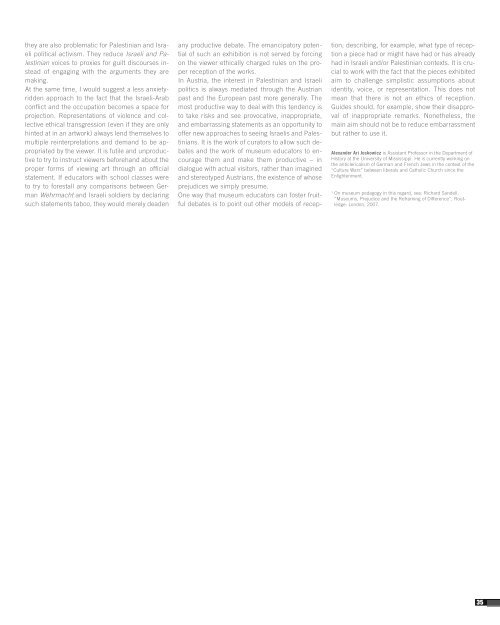katalog-overlapping voices - Ritesinstitute
katalog-overlapping voices - Ritesinstitute
katalog-overlapping voices - Ritesinstitute
Sie wollen auch ein ePaper? Erhöhen Sie die Reichweite Ihrer Titel.
YUMPU macht aus Druck-PDFs automatisch weboptimierte ePaper, die Google liebt.
they are also problematic for Palestinian and israeli<br />
political activism. they reduce israeli and palestinian<br />
<strong>voices</strong> to proxies for guilt discourses instead<br />
of engaging with the arguments they are<br />
making.<br />
at the same time, i would suggest a less anxietyridden<br />
approach to the fact that the israeli-arab<br />
conflict and the occupation becomes a space for<br />
projection. Representations of violence and collective<br />
ethical transgression (even if they are only<br />
hinted at in an artwork) always lend themselves to<br />
multiple reinterpretations and demand to be appropriated<br />
by the viewer. it is futile and unproductive<br />
to try to instruct viewers beforehand about the<br />
proper forms of viewing art through an official<br />
statement. if educators with school classes were<br />
to try to forestall any comparisons between german<br />
wehrmacht and israeli soldiers by declaring<br />
such statements taboo, they would merely deaden<br />
any productive debate. the emancipatory potential<br />
of such an exhibition is not served by forcing<br />
on the viewer ethically charged rules on the proper<br />
reception of the works.<br />
in austria, the interest in Palestinian and israeli<br />
politics is always mediated through the austrian<br />
past and the european past more generally. the<br />
most productive way to deal with this tendency is<br />
to take risks and see provocative, inappropriate,<br />
and embarrassing statements as an opportunity to<br />
offer new approaches to seeing israelis and Palestinians.<br />
it is the work of curators to allow such debates<br />
and the work of museum educators to encourage<br />
them and make them productive – in<br />
dialogue with actual visitors, rather than imagined<br />
and stereotyped austrians, the existence of whose<br />
prejudices we simply presume.<br />
one way that museum educators can foster fruitful<br />
debates is to point out other models of recep-<br />
tion; describing, for example, what type of reception<br />
a piece had or might have had or has already<br />
had in israeli and/or Palestinian contexts. it is crucial<br />
to work with the fact that the pieces exhibited<br />
aim to challenge simplistic assumptions about<br />
identity, voice, or representation. this does not<br />
mean that there is not an ethics of reception.<br />
guides should, for example, show their disapproval<br />
of inappropriate remarks. nonetheless, the<br />
main aim should not be to reduce embarrassment<br />
but rather to use it.<br />
alexander ari Joskowicz is assistant Professor in the Department of<br />
history at the University of mississippi. he is currently working on<br />
the anticlericalism of german and french Jews in the context of the<br />
“culture wars” between liberals and catholic church since the<br />
enlightenment.<br />
1 on museum pedagogy in this regard, see: Richard sandell,<br />
“museums, Prejudice and the Reframing of Difference”, Routledge:<br />
london, 2007.<br />
35


